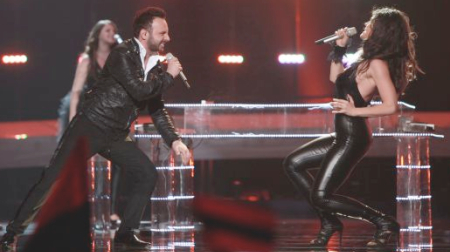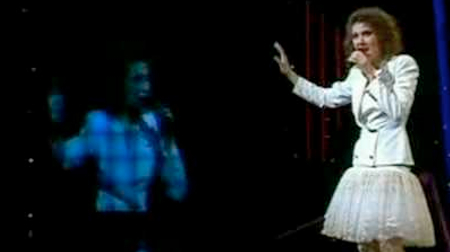With the introduction of the producer-led running order, another few variables can be addressed by the delegations looking for victory at the Eurovision Song Contest. Being anointed as ‘the favourite’ was a nice label to have in previous years, but with the running order being built around the remit of ‘good television’ it’s a label that can offer a better chance of walking away with the trophy.
Because Val Parnell Said So
While the exact rules that DR will be using to curate the running order for the Grand Final are not known, the general principles of a variety bill and an entertainment-led show are clear.
The big names that are top of the bill and making the headlines are going to run near the end. You are going to want to maintain interest throughout the programme, so the songs that people are expecting to hear are also going to be programmed towards the end of the run.
There’s no point pushing out the recognisable acts in the first few songs when you want to keep everyone on board for for well over ninety minutes of competitive music. If your primary focus is on an entertaining show, then you need to play with and build up expectations.
If people are expecting a certain song at this year’s Eurovision Song Contest, then the chances are it’s going to be later in the running order.
Exploiting Your Favourites For Viewing Figures
To be clear, the star power is not the only consideration in the running order – expect DR to continue the idea of saw-tooth, switching pace and genres between songs to provide as much contrast as possible in the running order, but deciding which fast song can close out an order will factor in the attractiveness of the group.
I don’t think it’s any wonder that Paula Selling & Ovi are closing out the second Semi-Final this year – the buzz around their return will be huge – and the expectations around the Greek entry in the TV audience on Thursday night have given them a later position as well. I’ll also note the medium paced ‘Round and Round‘ splitting these faster numbers to help create ‘distinctiveness’ in the order.

Its okay Ovi, nobody is watching your Billy Joel impression
Given the smaller splits for the semi-finals this year, and the wide range of genres, there’s not a lot of play in the semi-final system. Given a country only needs to get into the Top Ten to make it through to the veritable riches of Saturday night, a less than stellar position in the running order is not the end of the world.
But in the Grand Final? Oh yes, then it gets serious.
It’s All Coming Back To Running Last
Put simply, every delegation that has a song in the Saturday night will want a later position in the running order. Putting aside the very limited wildcard draw, until last year there was no way to influence a song’s position in the running order. That has all changed now thanks to a producer-led running draw.
Let’s do a little thought experiment. Imagine you are the producer of this year’s Eurovision Song Contest, and Switzerland have sent Celine Dion (calm down, Paul). Let’s also assume that Switzerland draw the second half of the running order.
You would be mad if you didn’t place her running in the last few songs. If it had any level of energy it would be a lock-in to close the show. Not because of any competitive considerations, but because the Variety Hall Rules of Television demand it. Nobody would complain that the biggest name was being held back to the end. Interest in her appearance would be incredibly high, viewers would tune in and stay tuned in to see it, and commentators would be teasing throughout the show and building up to it.
Perfect television, even if it does distort the competitive element of the Song Contest.

Seriously, she got a Vegas Residency after this…
It makes the draw for top or bottom half of the order even more cruel. With a big name in the top half the chances are they are going to be placed as late as possible to get the as much bang for their appearance as possible. Or they’re going to be ‘sacrificed’ to open the show with a bigger name to get the audience on board as quickly as possible, trading on some more favourites at the end of the show to keep them in place.
In 2013 that meant Cascada, running 11th, and Anouk, running 13th, where considered to be the biggest draws in the top half. If either of them had been in the second half, they would have been placed in the last few slots. I would have argued that Anouk could have taken Georgia’s spot at 25, and then who knows how much higher up than ninth ‘Birds‘ would have finished.
Even getting in to the back half of the order, and picking up some of the plum spots at 17th-20th in the running order where it feels like the winners usually sing is all dependent on being seen as a potential winner. And that means getting the publicity right beforehand.
Influencing The Order
It’s not an exact science, but after the semi-finals are over, DR are going to look at the various possible combinations and scenarios they have planned out, and decide which one to implement for Saturday night.
And that means looking at the feedback, the critical reaction, and potentially even the betting odds, to decide which songs are going to attract viewers to the Contest, which songs will keep them interested and engaged while they wait for them, and which songs can be considered as grist for the running order mill.
Right now, delegations can have an impact on that perception. Press teams more used to promoting songs in Top 40 charts across Europe are suddenly handed a beast they understand. They’re not being asked to promote a contestant in a competition, they’re being asked to do pre-release publicity and promotion for a hit single. The only difference is the currency is not the Euro, but the vote.
And if there’s one thing that the Record Company Press Teams can do, it’s promote a song before release and get the audience dripping with excitement. Songs needs to be evangelised in public, they need to be talked about in other media properties, fans need to be turned into Street Teams, and every scrap of publicity needs to be subtly highlighted to the team deciding the running order.
April Becomes Important
This ‘quiet’ period in April has become even more vital to determining the winning song for May’s Contest. Previously it was regarded as a time for rehearsals, a few promotion parties for the fans, and a chance for a delegation to quietly prepare for the trip to the host country.
Not anymore. Now April is a psychological battlefield of bluff, guile, PR moments, meet and greets, and more. All in the name of convincing everyone their song is more popular than the others.
It’s also a month where the community sites find themselves on the front line. Until the mainstream media turn up at some point during the first week of rehearsals, the numerous polls, reviews, previews, juries, comments, and discussion, can all serve to build up the momentum that is needed to get a later position in the running order.

Emmelie de Forest, looking for a second album in the twilight
After Dansk MGP last year, Emmelie de Forest started to build up momentum as ‘the favourite’ for the victory. As the National Finals fell, the buzz kept building. A smart appearance at the London Eurovision Party, and she went into Malmö as one of the shortest odd favourites possible.
While she didn’t feature in the final few songs of the Contest, she did land one of the key spots in the running order, and effectively opened up the final batch of powerhouse songs.
I’m sure that many delegations who are looking for victory will have taken careful note of the legitimate opportunities open to them now that the Song Contest is taking a more variety-led approach to the running order. This is a Contest after all, and if there is an edge to be won, a chance to improve the odds of a victory, is it any wonder that the hungry contenders will pounce on it?









i don’t see the EBU helping armenia win as yeravan isn’t developed enough to be the 60th anniversary host. sweden,norway,hungary would be acceptable
Superb article that only helps cement my believe that Jon Ola Sand was weak and pathetic for giving in to Christer’s demands last year, and just plain stupid and out of his depth for not reversing the decision this year.
The show producers should never have been given this much power and control over what is supposed to be a fair contest made up of a wide range of different styles. If DR don’t like a particular song, or worried it might clash with one of their own favourites, they’re perfectly entitled to bury it in first place, ignoring the chance that the rest of Europe might actually like it. For example, I see no reason to believe that the DR producers will care what the betting odds are in Portugal, or what the music PR bods are pushing in the Baltic States, when they know their local audiences won’t care for those songs. Or worse still, you get the reverse happening where a completely awful song gets a totally undeserved place at the top of the billing just because they’re a “big name” (*cough*Paula+Ovi*cough*).
And sure, the EBU might have final approval over the running order to prevent the show producers from cheating, but what can they really do apart from rubber-stamp whatever piece of paper gets put in front of them? Any producer capable of fixing the order in their favour will easily be capable of coming up with some fake justifications just to keep the Reference Group happy.
(Sorry Ewan, I didn’t intend this to be quite as big a rant when I started, but it’s one of those disgustingly moronic decisions that just annoys me beyond belief! Ah well… Taking a deep breath… Counting to 10… and relax…)
Astroturf April?
“producer-led running draw”
Interesting choice/accident.
I think London would be the perfect host for the 60th anniversary. It’s very easy to get to and they did a brilliant job at the Olympics. Uk is my favourite entry this year. Power to the people! 12 points from Hungary!